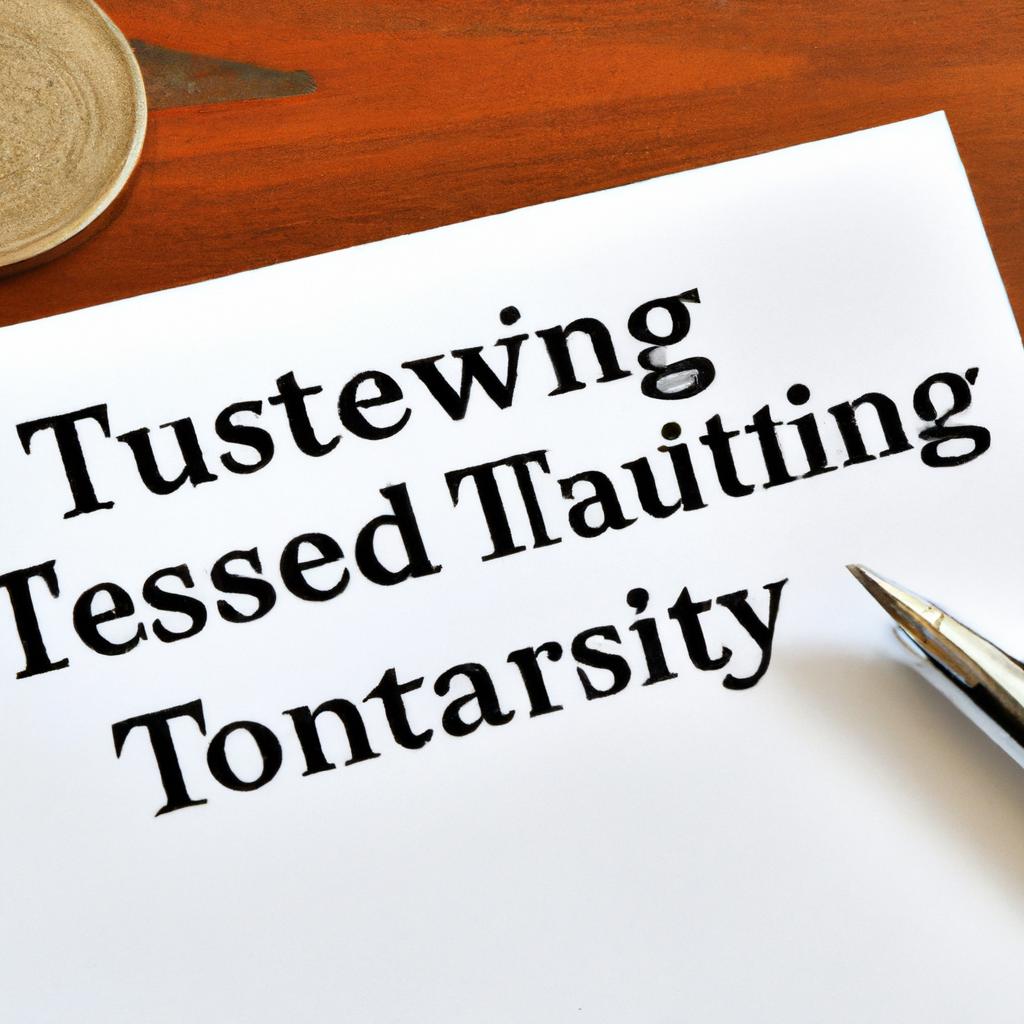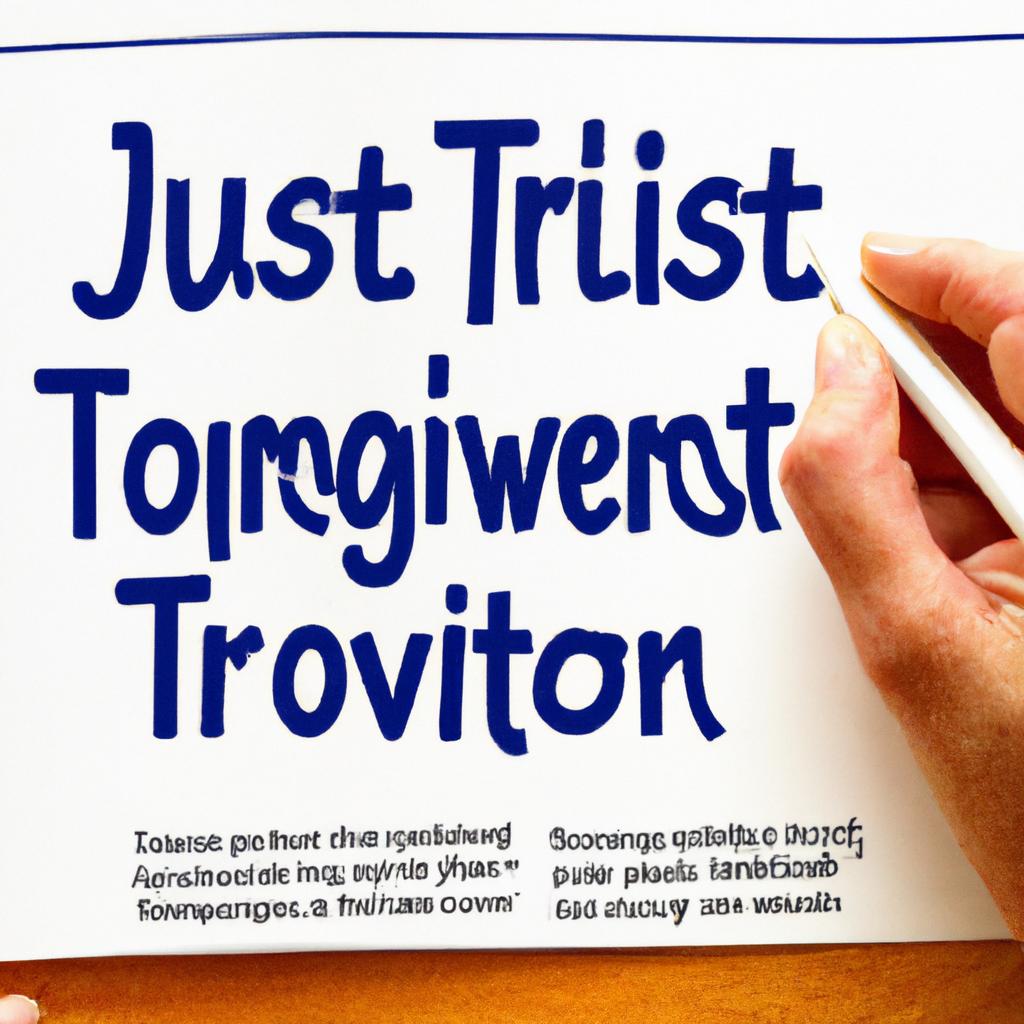In the intricate realm of estate planning, few tools offer as comprehensive and flexible a solution as the joint living trust. As seasoned practitioners at Morgan Legal Group in the bustling metropolis of New York City, we understand the intricacies of this powerful legal instrument. Join us as we unravel the complexities of what a joint living trust entails, providing clarity and insight into its benefits and implications for individuals seeking to secure their financial legacies.
Understanding the Purpose of a Joint Living Trust
In a joint living trust, also known as a shared living trust or a joint revocable trust, a couple creates a single trust together to hold their assets during their lifetimes and distribute them after both spouses pass away. This legal arrangement allows both partners to manage their assets together and ensures a smooth transition of assets to heirs without the need for probate.
<p>A joint living trust typically offers the following advantages:</p>
<ul>
<li><strong>Probate avoidance:</strong> Assets in the trust are not subject to probate, saving time and money for the surviving spouse and beneficiaries.</li>
<li><strong>Privacy:</strong> Since the trust document is not public, details of the assets and beneficiaries remain private.</li>
<li><strong>Flexibility:</strong> The trust can be modified or revoked during the lifetimes of both spouses to accommodate changing circumstances.</li>
</ul>

Key Benefits of Establishing a Joint Living Trust with Your Spouse
A joint living trust is a legal arrangement that allows married couples to combine their assets and manage them together during their lifetime. This type of trust can provide several key benefits for spouses who wish to plan their estate effectively and protect their assets for future generations. One of the primary advantages of establishing a joint living trust with your spouse is the ability to avoid probate, which can save time and money for your loved ones after you pass away. By transferring your assets into a trust, you can ensure that they are distributed according to your wishes without the need for court intervention.
- Asset Protection: By creating a joint living trust, you can protect your assets from creditors and lawsuits, ensuring that your property is preserved for the benefit of your family.
- Privacy: Unlike a will, which becomes a public document after probate, a living trust allows you to maintain privacy regarding your estate plans and financial affairs.

Factors to Consider When Setting Up a Joint Living Trust
When setting up a joint living trust, there are several important factors to consider in order to ensure that your wishes are accurately reflected and your assets are properly protected. One key consideration is to determine who the trustees of the trust will be. Trustees are responsible for managing the trust assets and ensuring that they are distributed according to the terms of the trust. It is important to carefully select trustees who are trustworthy, responsible, and capable of carrying out their duties.
Another important factor to consider when setting up a joint living trust is the division of assets. You will need to decide how your assets will be divided among the beneficiaries of the trust. This may involve creating a detailed inventory of your assets, including real estate, investments, and personal property, and determining how these assets will be distributed. It is essential to clearly outline your wishes in the trust document to avoid any confusion or disputes among beneficiaries.

Recommendations for Managing and Updating Your Joint Living Trust
When it comes to managing and updating your joint living trust, there are a few key recommendations to keep in mind. Firstly, it is important to regularly review and update your trust documents to ensure that they accurately reflect your current wishes and circumstances. This includes making any necessary changes to beneficiaries, trustees, or distribution instructions.
Additionally, it is crucial to communicate with all parties involved in the trust to ensure everyone is on the same page and understands their roles and responsibilities. This can help prevent misunderstandings or conflicts down the line. Finally, seeking the guidance of an experienced estate planning attorney can provide invaluable assistance in navigating the complexities of managing and updating your joint living trust.
Q&A
Q: What is a joint living trust?
A: A joint living trust is a legal document that allows a couple to create a single trust together to manage their assets during their lifetime and distribute them to their beneficiaries after their passing.
Q: How does a joint living trust differ from an individual living trust?
A: A joint living trust is designed for married couples or partners who have shared assets and wish to manage them together. An individual living trust, on the other hand, is created by and for a single person to manage their own assets.
Q: What are the benefits of a joint living trust?
A: Some benefits of a joint living trust include the ability to jointly manage assets, avoid probate, maintain privacy, and provide for a surviving spouse or partner.
Q: Can a joint living trust be changed or revoked?
A: Yes, a joint living trust can be amended or revoked by both parties while they are still alive and competent. After one party passes away, the surviving individual may have the ability to amend or revoke the trust on their own.
Q: How should someone go about creating a joint living trust?
A: To create a joint living trust, couples should consult with an estate planning attorney to discuss their goals and wishes. The attorney will help draft the trust document and ensure that it is properly executed and funded.
Q: Are there any downsides to a joint living trust?
A: While joint living trusts offer many benefits, they may not be suitable for all couples. They can be complex to set up and maintain, and may not be necessary for couples with simpler estates or assets.
Q: How does a joint living trust help with estate planning?
A: A joint living trust can help couples plan for the distribution of their assets, minimize estate taxes, avoid probate, and provide for loved ones after their passing. It is a valuable tool for comprehensive estate planning.
The Conclusion
In conclusion, a joint living trust is a powerful tool that allows couples to protect and manage their assets during their lifetime and ensure a smooth transfer of wealth to their beneficiaries after their passing. By working together to establish and fund a joint living trust, couples can enjoy peace of mind knowing that their financial affairs are in order and their loved ones are provided for. If you and your partner are considering setting up a joint living trust, be sure to consult with a legal and financial advisor to ensure that it is tailored to meet your specific needs and goals. By taking proactive steps now, you can pave the way for a secure and prosperous future for you and your loved ones.
 A joint living trust is a legal document that is created by two individuals, typically spouses, to control and manage their assets during their lifetime and after their deaths. This type of trust is also known as a shared living trust, spousal living trust, or revocable living trust. It offers numerous benefits and serves as an efficient and flexible estate planning tool for couples. In this article, we will dive deeper into what a joint living trust is, how it works, its benefits, and why you should consider creating one for your estate planning needs.
A joint living trust is a legal document that is created by two individuals, typically spouses, to control and manage their assets during their lifetime and after their deaths. This type of trust is also known as a shared living trust, spousal living trust, or revocable living trust. It offers numerous benefits and serves as an efficient and flexible estate planning tool for couples. In this article, we will dive deeper into what a joint living trust is, how it works, its benefits, and why you should consider creating one for your estate planning needs.
Understanding a Joint Living Trust
A joint living trust is a legal contract between two individuals that holds all of their joint assets in one place. These assets could include real estate, bank accounts, investments, and any other property they jointly own. It is revocable, which means that the trust can be changed or terminated at any time by the grantors (the individuals who create the trust). The grantors also have full control over the trust’s assets and can manage them as they see fit during their lifetime.
How Does a Joint Living Trust Work?
The first step in creating a joint living trust is to determine whether it is the right estate planning tool for you and your spouse. Next, you and your spouse will need to decide how to divide your assets, what assets you want to include in the trust, and how they should be managed. Once these decisions are made, you will need to consult with a qualified estate planning attorney who will draft the trust document and help you and your spouse fund the trust.
Funding the trust involves transferring the ownership of your assets into the trust. For example, if you and your spouse own a home, it can be titled as owned by the trust rather than owned by the two of you as individuals. This process is called “funding the trust” and is essential for the trust to be valid and effective. When all assets are properly transferred to the trust, it becomes the legal owner of those assets.
Benefits of a Joint Living Trust
1. Avoiding Probate: Probate is the legal process of proving the validity of a will and transferring the assets of the deceased to their designated beneficiaries. It can be lengthy, costly, and open to the public, often leading to family disputes and delays in asset distribution. With a joint living trust, your assets will not go through probate, and they can be distributed to your beneficiaries immediately upon your passing.
2. Protection From Incapacity: In the event that you or your spouse becomes incapacitated and unable to make financial decisions, a joint living trust can provide protection. The trust document will specify who will take over managing the trust assets and how they should be managed in your best interests.
3. Privacy: As mentioned, probate is a public process, meaning that all court documents are available to the public. With a joint living trust, no court involvement is necessary, ensuring the privacy of your estate and your beneficiaries.
4. Flexibility: A joint living trust is revocable, meaning that it can be changed or amended at any time. If you or your spouse have a change in circumstances, you can modify the trust to reflect those changes.
5. Estate Tax Planning: A joint living trust can also help with estate tax planning. By owning assets jointly, you can take advantage of the marital deduction for estate taxes, which allows married couples to transfer assets to each other without being subject to estate taxes.
Tips for Creating a Joint Living Trust
1. Hire a qualified estate planning attorney who can guide you through the process and ensure that your trust is properly funded.
2. Keep accurate and up-to-date records of all trust assets.
3. Review and update your trust regularly, especially after any significant life changes, such as the birth of a child, purchase of new assets, or change in tax laws.
Real-Life Case Studies
John and Sarah were a married couple in their forties with two young children. They decided to create a joint living trust to protect their assets and provide for their children in the event of their passing. Unfortunately, John passed away in a car accident, leaving Sarah to care for their children and manage their joint assets. Since their assets were held in the trust, Sarah avoided the lengthy and costly probate process and could immediately access the trust’s funds to support their children.
Mary and David, a married couple in their sixties, decided to create a joint living trust to protect their assets and provide for their children and grandchildren. They regularly reviewed and updated their trust as their family expanded. In their later years, Mary was diagnosed with Alzheimer’s, and David was able to manage their assets and provide for Mary’s care, thanks to the provisions included in their joint living trust.
In conclusion, a joint living trust is an efficient and effective tool for couples who want to protect their assets, provide for their loved ones, and have control over their estate during their lifetime and after their passing. It offers numerous benefits and flexibility, making it a popular choice for estate planning. If you are considering creating a joint living trust, consult with a qualified estate planning attorney who can help you navigate the process and ensure that your trust is properly funded and updated.

